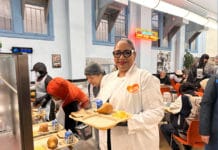by Nevin Long

Activists, business owners and community members argued that victims of the War on Drugs should be given consideration as the city of San Francisco develops licensing policy for its fledgling recreational marijuana industry at a community forum on Oct. 21. San Francisco lags behind Oakland, where an equity policy was adopted well in advance of legalization on Jan. 1.
The forum, which was held at the historic Bayview Opera House Ruth Williams Memorial Theater and called by San Francisco Supervisor Malia Cohen, was designed to engage community members in discussion regarding the cannabis industry. Two panel discussions were held, one which dealt with economic issues surrounding recreational cannabis, the other a potential equity program.
Members of the first panel were quick to point out that San Francisco had yet to develop a comprehensive procedure for issuing sales licenses to recreational marijuana businesses and would likely miss the January 1 deadline for doing so. Members of both panels said that this should be an opportunity to influence the undetermined program’s structure.
Demetrius Robinson and Raeven Duckett, who together run the Oakland medical marijuana delivery service Community Gardens, participated in the forum. They say San Francisco could benefit from an equity program like the one currently in place in Oakland.
There, 50 percent of all medical marijuana licenses were reserved for communities and neighborhoods disproportionately affected by the War on Drugs. This meant that many equity program applicants came from Oakland’s District 6, which is represented by equity pioneer Councilperson Desley Brooks, where residents were 10 times likelier to have been convicted of a marijuana offense.
The forum, which was held at the historic Bayview Opera House Ruth Williams Memorial Theater and called by San Francisco Supervisor Malia Cohen, was designed to engage community members in discussion regarding the cannabis industry.
Additionally, all applicants to the general licensing program must be paired as “incubators” with equity licensing applicants. The incubator program lasts three years, and the general licensee must agree to pay real estate costs for that term in addition to sharing the kind of information vital to keeping a business afloat.

Robinson, now the co-owner of a business and graduate of Morehouse College, was one such drug war victim who now benefits directly from the Oakland licensing program. Both of his parents were dealers who later became addicts. Eventually, his father was forced to flee Oakland in fear for his life.
He and Duckett, who are spouses in addition to business partners, say the equity program was instrumental in the success of their business.
“The path to entering the business was kind of cloudy,” Duckett said, who Robinson credits for getting the pair into the business in the first place.
But then the two met the chocolatiers at Kiva Confections, the Oakland-based medical marijuana outfit which specializes in sweet edibles. Their help came at an opportune moment for the duo, said Duckett.
“We were interviewing consultants who charged $5,000 per week,” she said.
Officials at Kiva showed Duckett and Robinson the ropes, and the two say that it was this shared knowledge which gave them the business acumen to stay afloat.
Demetrius Robinson and Raeven Duckett, who together run the Oakland medical marijuana delivery service Community Gardens, participated in the forum.
Juell Stewart, a forum panelist and communications director at Hood Incubator, an Oakland non-profit which provides supportive business services to equity license-holders, believes that this kind of cooperation is the way forward for communities who have historically been barred from more mainstream sectors of the economy. In this way, she believes Oakland can serve as a model for San Francisco.


“We think a lot of the innovation comes from the approach of pooling resources and encouraging General Applicants and Equity Applicants to work together, making the process more collaborative and meaningful,” Stewart said.
She says San Francisco should also follow Oakland’s lead by responding to its challenges through developing a licensure policy that puts existing communities at the forefront. If that happens, she says there could be a substantial positive economic impact on the city’s Black community.
“Skilled labor is needed from seed to sale, so as long as we’re ready to jump at those positions, there’s nothing stopping us from taking part,” Stewart said, “The industry as a whole hit $6.7 billion in 2016 alone; after California introduces adult use, the numbers are projected to double.”
“We think a lot of the innovation comes from the approach of pooling resources and encouraging General Applicants and Equity Applicants to work together, making the process more collaborative and meaningful,” Stewart said.
That kind of money can attract a lot of attention. Duckett and Robinson say they know that corporate interests are already eying California’s legal marijuana market.

“Sharks are in the water,” Duckett said, and she sees those interests as her real competition, not other members of the existing cannabis community. “Competition is when Amazon comes in.”
This is why Robinson believes so strongly in mutual aid, particularly between beneficiaries of the equity program. It was for this reason that the pair joined the Green Huddle program, a school of sorts which they use to pass on the teachings Kiva gave them. They want longevity for themselves and all of the program’s participants.
“We don’t want to just get them to the door,” Robinson said, “We want to get them through the door and keep them compliant [with industry regulations].”
He says as long as people cooperate, San Franciscans can benefit from an equity program just as much as Oaklanders. He sees plenty of space in the market for those who are willing to work together.
“There’s so much out there for all of us to share,” Robinson said.
Nevin Long, a San Francisco State University journalism student, is an intern with the Bay View. He can be reached at nevin@sfbayviewnews.wpenginepowered.com.

 Store
Store












